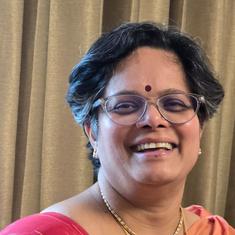National champion Manju Kumari had prepared for the Asian Wrestling Championship trials for months. The national champion in the 58 kg weight category, however, lost to Rio Olympics bronze medallist Sakshi Malik in the final of the trials and missed out.
But on the eve of Asian Championship, Malik was moved up to 60 kg category after it was clear that the 24-year-old Olympic medallist would not make the weight to compete in 58 kg – which should have actually raised questions on whether she was also overweight during the trials.
Since winning the bronze medal, Malik had been busy with her felicitations, promotional events and then her wedding before the trials and it was understandable that the first Indian woman to win an Olympic wrestling medal was slight overweight and by that logic should not have competed in the championship.

Kumari did raise the issue by staking claim to the 58 kg spot but Wrestling Federation of India brushed aside her protests by swapping Malik in instead of Sarita Mor, who had won the trial in the 60kg weight category.
The incident is a clear example of how popularity and star status of a player made the concerned federation overlook its own rules and accommodate her. Malik went on to win a silver and so did Sarita, who would have to shed additional two kilograms before the weigh in to be eligible to compete.
In fact, Ramchandra Guha’s hard-hitting letter to the Board of Control for Cricket in India’s Committee of Administrators’ chairman Vinod Rai on how the “superstar culture” is ailing Indian cricket can be applicable to most sports in India.
The top performers in other sports may not be as popular as the cricketers and may not have as much a clout as their bat-wielding counterparts but they do manage to control and bend the system for their benefit.
Otherwise in which country would a Sushil Kumar, a two-time Olympic medallist, expect to get a shot at 2016 Rio Olympics berth through a last-minute trial against Narsingh Yadav in the 74 kg category despite not competing in any tournament for over a year due to injury? He had not even bothered to attend the training camps or keep the national coaches abreast of the extent of his injury and his training program for a weight category in which he had competed only once (in 2014 Commonwealth Games).
Sushil probably failed to get away with the demand simply because of the internal politics of the association, but in most cases the federations don’t like to antagonise the top stars even at the cost of doing injustice to others.
Indian tennis has seen this drama unfold umpteen times in the past one decade even at the cost of putting its best foot forward at the Olympics. In the run up to the 2012 London Games, the All India Tennis Federation forced Sania Mirza to partner Leander Paes in the mixed doubles only because it had to pacify the 43-year-old after they failed to convince Mahesh Bhupathi to play with him in men’s doubles.
In 2016, Mirza called the shots about her women and mixed doubles partners as she was then the World number one and the federation had already taken care of Paes’ ‘dream’ of playing a record seventh Olympics by ‘convincing’ Rohan Bopanna for men’s doubles pairing.
For years, players have been critical about Paes’s selection in the Davis Cup squad as well. But the man, Mahesh Bhupathi, who ultimately dropped him from the tie against Korea in April for turning up late for the preparatory camp was guilty of the same for years during his playing days.
— Leander Paes (@Leander) April 9, 2017
In fact, Bhupathi has also got away with running an academy, a management company that signed players and organise tournaments even while he was an active player.
In badminton, the likes of Prakash Padukone, Vimal Kumar and now Pullela Gopichand have been running private academies while they held the post of National Coach and the Badminton Association of India has always turned a blind eye towards this conflict of interest.
Even the sports ministry has been guilty of falling prey to the superstar culture. Only that can explain how an Abhinav Bindra or a Mary Kom were part of the Talent Olympic Podium Scheme committee which cleared funding proposals and were also among the applicants.
Even the recently released list of government observes who would be guiding the Ministry on the way ahead and selection has a few players who are still active on the national and international circuit and have been named in the list only because of their superstar status with no consideration to the conflict of interest angle.
Same is the case with the Central Bureau of Investigation’s inquiry into Indian Olympic Association’s sending their kith and kins as “experts” to the Rio Olympics. While the inquiry is a welcome move, IOA and the ministry also need to explain how parents of many top players end up being part of the contingent for multi-discipline events like Asian Games and Olympics despite not having any qualification required to be part of the entourage.
For other tournaments where the government or the federation isn’t willing to pay for the parents to travel with the player, the stars have managed to push the Non-Governmental Organisations (NGO) supporting them to foot the bill and they oblige because they can’t afford to lose the talent by not giving into their “requests”.
From a layman’s perspective it is difficult to understand why these NGOs need to entertain such irrational requests when they are the ones extending support to their career. But given the fact that there are very few players who attract attention and thereby help these organisations raise funds for the next rung, the superstars also know that they can get away by flexing some muscle.










